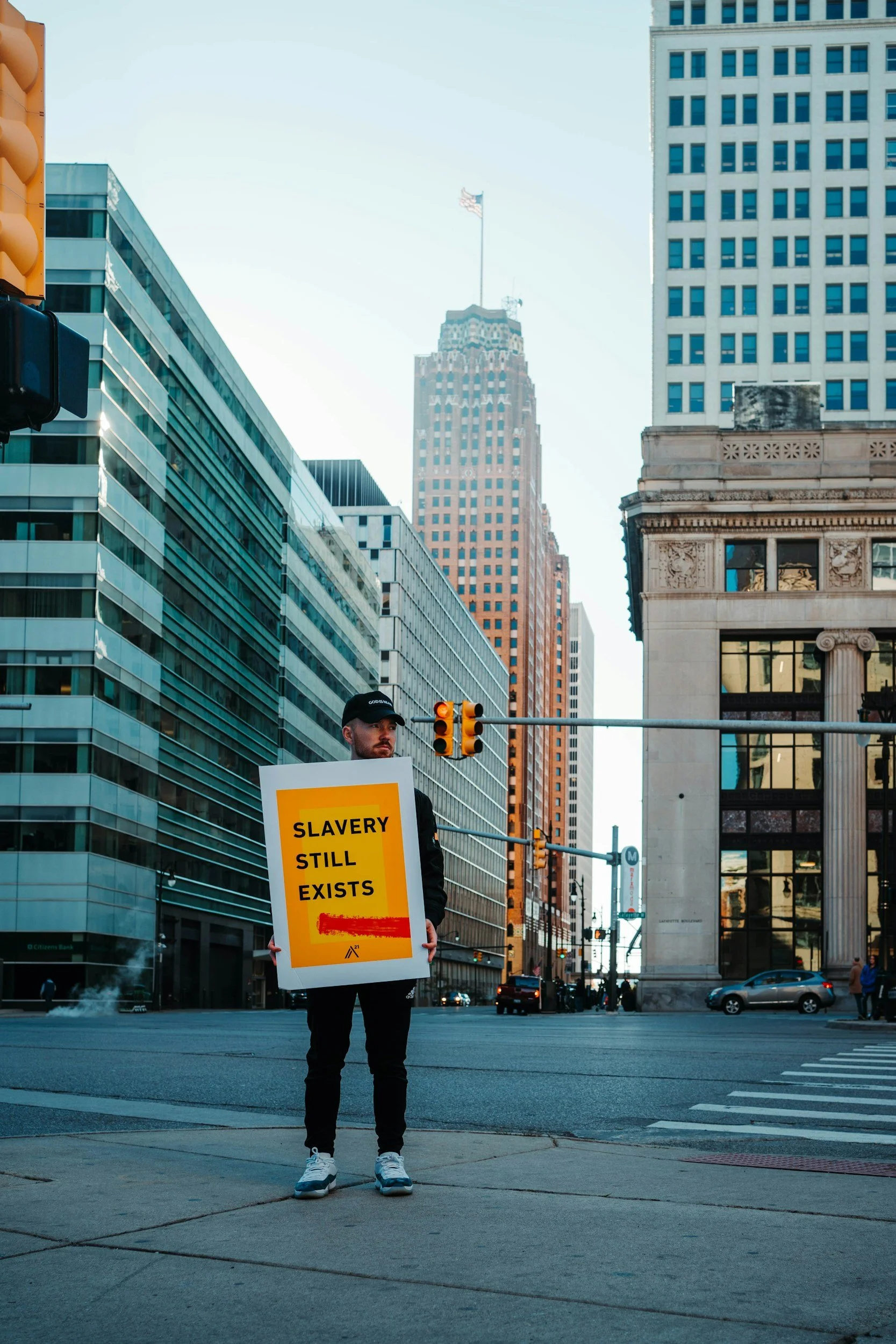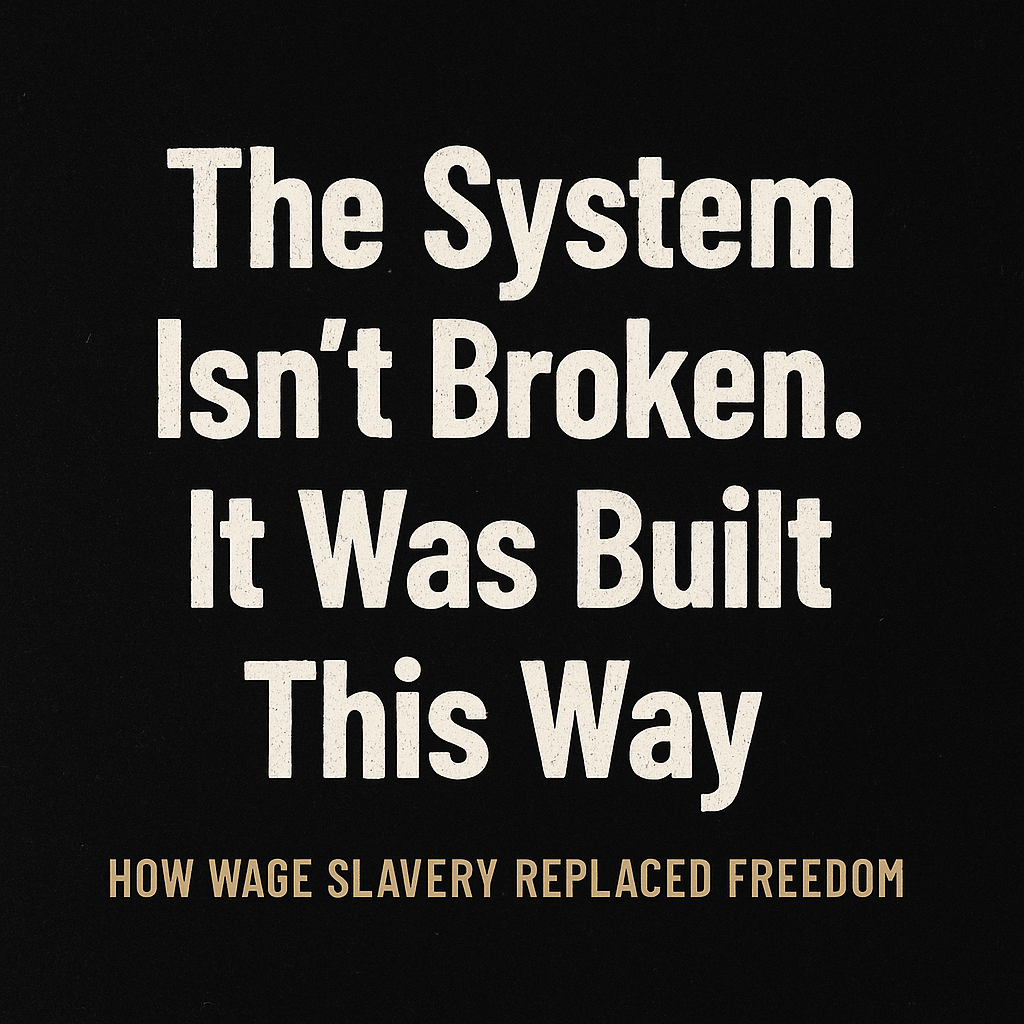Slavery Never Ended—They Just Gave It a New Name
How the system of economic control keeps you working, broke, and obedient
Most people think slavery ended. It didn’t—it just got rebranded. Today’s chains are financial, not physical. Here’s what that looks like.
Modern Slavery vs. Wage Slavery
When we hear modern slavery, we think of forced labor, human trafficking, and servitude—brutal, undeniable forms of exploitation that governments recognize and outlaw.
In Australia, the Modern Slavery Act 2018 defines modern slavery as coerced, forced, or deceptive exploitation that strips people of their freedom. This includes human trafficking, debt bondage, forced marriage, servitude, and forced labor—practices that resemble historical slavery in many ways. The UK and US have similar laws to address these extreme cases.
But while modern slavery in this legal sense is horrific, there’s another form of control—one that’s normalized, socially accepted, and yet still highly restrictive.
This is wage slavery—a system that doesn’t need physical chains because it has economic ones.
⛓️ You are locked into a cycle of labor where survival depends on working.
⛓️💥 You are paid just enough to get by, but rarely enough to build lasting financial security.
👵🏾 The system relies on your most productive years, often leaving workers exhausted by the time they reach retirement.
Unlike modern slavery, wage slavery isn’t illegal—it’s the foundation of our economy.
This is not the freedom we were promised.
Historical slavery was overt and violent, and so we knew we needed to escape. Wage slavery is covert—so most people don’t even realise they’re in it. A submissive society is easier to manage when it doesn’t know it’s enslaved.
Wage Slavery: Who Benefits From It?
If wage slavery exists, who benefits?
The answer is clear:
Corporations, which need cheap, replaceable labor.
Governments, which rely on taxes to sustain themselves.
Taxes Are Designed to Keep You in Line
You work to earn money. But before you even see it, the government takes its cut.
Your labor is taxed before it reaches you (PAYG, income tax).
Your spending is taxed (GST, VAT, sales tax).
Your property is taxed (stamp duty, land tax, council rates).
Your savings are taxed (capital gains tax, dividend tax).
When you die, your wealth is taxed again (inheritance tax, estate duties).
No matter how hard you work, a portion of your productivity is automatically extracted to sustain the system that keeps you dependent.
Meanwhile, the wealthy play by different rules.
They use tax loopholes, offshore accounts, and trusts to reduce or eliminate taxes.
They own assets that generate passive income, rather than relying on wages.
They fund politicians to shape laws that favour them.
But for wage slaves? You get no tax breaks—just the burden of keeping the system running.
And before you say, “But taxes pay for schools, hospitals and transport,” yes thats one purpose they serve but read this: “Are Taxes Funding Society or Wage Slavery?” (coming soon)
⭐️ Ready to rethink the system—and your place in it?
📩 Join My Newsletter
For behind-the-scenes updates on my corporate exit, plus practical tools on financial independence, homeownership, expat life, and building a more intentional life, subscribe to my newsletter.
Wage Slavery: The Illusion of Choice
We grow up believing in the dream—study hard, work hard, climb the ladder, and retire comfortably. But for many, reality doesn’t match the promise.
⏳ You trade your time for money, but never enough to be free.
📉 Wages rarely keep up with inflation, forcing you to work longer just to stay afloat.
🎉 Raises and promotions are designed to sustain motivation, but rarely bring true freedom.
🐢 Advancement comes slowly, keeping most people stuck for decades.
😎 Work cultures discourage long breaks, and side hustles are seen as disloyal or unrealistic.
The Skilled Visa System: Indentured Servitude Rebranded
Wage slavery is bad enough when you're a citizen. But when you're on a skilled visa, the chains are even tighter.
Your right to stay is tied to your employer.
You can’t switch jobs easily without risking deportation.
You’re treated as temporary labor—often underpaid and overworked.
📣 I’ve been through the Skilled Visa process myself. Some companies are excellent. But many skilled migrants face severe restrictions and unfair conditions. The lower the level of employment, the more it resembles indentured servitude—with lower pay, higher demands, and limited rights.
Consultancy: Where The Economics Are Most Visible
Working for one company makes it easier to ignore the system. But consultancy? That’s where the wage slavery model is laid bare.
The business model is simple:
Sell the consultant at a premium,
Pay them a fraction, and
Pocket the rest.
As a consultant:
You are the product. The firm doesn’t just sell services—they sell you.
Your labour is bought and sold at a markup.
The firm takes a huge cut while paying you a fraction of what you generate.
You’re often “rented out” to multiple clients—without extra pay.
In some cases, you’re expected to secure your next role yourself, while the firm continues to take their cut.
Some consultancies don’t even have:
A legal department
A marketing team
A business development division
A procurement or resourcing function
Instead, they expect the consultant—you—to do all of this too. Free labour.
They leverage existing staff by hiring multi-skilled individuals who can perform multiple roles—at no additional cost to the owners. This business model is genius—from the top.
You’re expected to:
Deliver the service
Find the next client
Negotiate contracts
Handle onboarding
Support business growth
All while being charged out at premium rates but no additional income for you.
The Prestige Illusion
One of the biggest tricks? The false prestige.
Titles like Senior Consultant, Associate Director, or Director are designed to make you feel important—and keep you running on the corporate hamster wheel.
But the truth is:
You’re still a commodity.
You’re still being sold.
Meanwhile, the real directors and owners earn passive income from your labour—growing wealth with every hour you work. Their only obligation? Attend meetings and market you—often making promises that don’t even align with your skill set.
Of course, not all consultancies operate this way—but the business model naturally lends itself to certain pressures. Recognising that early gives you the chance to protect your value.
📣 Disclaimer: I’ve worked for several consultancies. Some are excellent—offering training, mentorship, and genuine investment in people. I know there are worse jobs out there, and some consultancies genuinely do it well. But many expose just how exploitative the model can be.
Once you see it, it’s impossible to ignore.
How to Work Without Feeling Like a Wage Slave
Not everyone can or wants to escape the system entirely. And not every job is exploitative. Here’s how some people work within the system—without feeling trapped by it:
Know your values—and your non-negotiables
Work feels oppressive when it violates your core beliefs. Clarify what matters most: flexibility? autonomy? purpose?
Reclaim agency where you can
Even in consulting, you can set boundaries, choose clients that align with your skills, and negotiate contracts that protect you.
Build options
Side income, savings, 3-6 months living costs saved as emergency fund or even learning a new skill can make it easier to say no to the wrong work—and yes to what serves you.
Avoid status traps
Fancy titles don’t guarantee freedom. True success is being able to walk away.
Be intentional
Don’t default into roles. Choose work consciously—even if it means staying temporarily while building your exit or balance strategy.
Use Consulting as a Launch Pad
The consulting model can feel exploitative—but it also offers one of the steepest learning curves in business. You’re exposed to everything: client delivery, business development, contract negotiation, onboarding, even recruitment and marketing.
This makes consulting one of the few roles where you learn how to build and run a business—because you’re already doing it (just not for yourself). If you can build someone else’s business from the inside, you might just be ready to build your own.
That’s how I see my role today: a training ground for the next chapter. I’m using what I’ve learned to build something of my own—right here, in plain sight. Want to follow along? subscribe to my newsletter!
You can still be in the system without being consumed by it. But that takes awareness, strategy, and the courage to ask: Is this still working for me?
🔜 Blog Post “Entrepreneurship vs Employment vs. Employee Entrepreneurship: Pros and Cons, Which One is Right For You?” (coming soon)
🔜 Blog Post “Radical Responsibility, Acceptance and Compassion: Why I’ve Decided Everything Is My Fault and How Empowering This Is” (coming soon)
📩 Join My Newsletter
For behind-the-scenes updates on my corporate exit, plus practical tools on financial independence, homeownership, expat life, and building a more intentional life, subscribe to my newsletter!
Governments, Corporations, and Banks—The Three Masters of Wage Slavery
Wage slavery doesn’t happen by accident. It’s a result of intentional systems designed to keep most people dependent, compliant, and too tired to rebel.
1. Corporations: The Work & Productivity Machine
The 40-hour workweek, designed in the industrial era, still controls our lives—keeping your best hours locked away.
You’re taught to chase promotions instead of freedom.
You’re rewarded just enough to stay motivated—but not enough to walk away.
2. Banks: The Debt Trap
From student loans to credit cards, car loans to mortgages—debt is normalised from a young age.
Banks profit when you’re financially stretched—they don’t want you debt-free.
Interest ensures you pay back far more than you borrowed, locking you into long-term servitude.
3. Governments: The Tax Harvesters
Income tax takes earnings before they hit your account.
Sales tax hits you every time you spend.
Property taxes (stamp duty, land tax, council rates) make homeownership a lifelong burden.
Investment taxes (capital gains, dividends) punish savers.
Estate taxes claim your wealth after you die.
Inflation acts as a hidden tax—silently eroding the value of your savings.
Meanwhile, the rich avoid all of the above with trusts, assets, and influence.
This isn’t a broken system—it’s a working trap.
Escaping Wage Slavery
The system is designed to extract maximum value from you while giving just enough to prevent rebellion.
The only real escape is to reduce dependency and build your own way out.
1. Reduce Dependence on a Job
Build alternative income streams: freelance work, investing, online business, real estate.
Promotions are golden handcuffs—don’t confuse status with freedom.
2. Minimise Debt & Expenses
Cut spending that keeps you in a paycheck-to-paycheck loop.
Avoid lifestyle inflation—freedom is worth more than looking successful.
3. Own Your Time
Work fewer hours where possible.
Detach from hustle culture—exhaustion isn’t a badge of honour.
Prioritise value creation over time sold.
4. Question Every “Life Milestone”
Marriage, kids, homeownership—don’t take on burdens just because society expects it.
Choose goals that align with your actual values, not peer pressure.
You don’t need a wedding, a big house, a new SUV or a luxury car to “prove” you’re successful.
🧠 The strongest chains are social.
The fear of being judged, misunderstood, or left out keeps people stuck.
“You’re strange for living differently,” they say.
But what they really mean is: “You’re making me question the system I’ve built my life around.”The Trouble With Escaping Wage Slavery
Even once you see the system, escaping it is hard. Here’s why:
Security is addictive. A regular paycheck feels safer than the unknown.
Risk is expensive. Building your own path takes time, energy, and often money—things most workers are short on.
Peer pressure is real. Friends, family, and coworkers may guilt you back into the system:
“Why would you leave a good job?” “Just get the promotion—it’s more money!” “Don’t you want to settle down?”
The herd doesn’t like when you step out of line.Failure isn’t safe. If you fall, there’s little cushion. And the system will say, “See? That’s why you shouldn’t try.”
That’s why so few make it out. Not because they can’t—but because the system is designed to make staying stuck feel rational.
Seeing the Chains Is the First Step to Breaking Free
Wage slavery is legal. It’s even celebrated. But that doesn’t make it freedom.
The system is designed to keep you stuck:
Governments need your taxes.
Corporations need your labour.
Banks need your debt.
And they all win when you stay tired, busy, and just comfortable enough to comply.
But now you’ve seen the chains.
The real question is:
🧭 How much of your life are you willing to trade before you decide enough is enough?
Working doesn’t have to mean wage slavery.
When your work aligns with your values, when you're not living paycheck to paycheck, and when you have a plan—freedom is possible even inside the system.
It’s not always about quitting. Sometimes it’s about reclaiming your terms.
📚 Want to Understand the System Better? Read These Books
These books opened my eyes and gave me tools to take back control:
Get Out While You Can: Escape The Rat Race - George Marshal (Amazon)
The Psychology of Money: Timeless Lessons on Wealth, Greed, and Happiness – Morgan Housel (Amazon)
📩 Join My Newsletter
For behind-the-scenes updates on my corporate exit, plus practical tools on financial independence, homeownership, expat life, and building a more intentional life, subscribe to my newsletter!
🖌️ Related Articles:
How I Used Quantity Surveying Skills to Master My Personal Finances
Debt, Discipline & That Magic £15K: How I Built My Emergency Fund (and Started Living on Cash)
Are Taxes Funding Society or Wage Slavery? (coming soon)
Entrepreneurship vs Employment vs. Employee Entrepreneurship: Pros and Cons, Which One is Right For You? (coming soon)
Radical Responsibility, Acceptance and Compassion: Why I’ve Decided Everything Is My Fault and How Empowering This Is (coming soon)
Comparing US, UK, and Australian Investments: A Guide for Expats and Savvy Investors
How to Protect Yourself When Buying Property With Someone Else: 7 Lessons I Learned the Hard Way
Climate Change and Sydney’s Property Market: The Hidden Factor Driving Prices Up






